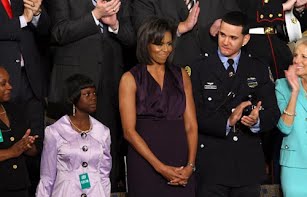Real talk from Michelle Obama

Last week Time Magazine had a great interview with Michelle Obama. It's fun to read because it seems like Time just published the transcription straight from the tape recorder (the "likes," "I means" and "you knows" are still included in the final copy) and Michelle comes across as sharp, honest and open-- not like she's been media-trained within an inch of her life.
My favorite part was her response to a question about the criticism of a dress* she wore to a congressional speech. Of all things, I know, deep thoughts on clothing! But her attitude can be applied beyond fashion-- and I think it's a very relevant message, particularly for women, who often go along with a flow set by someone else rather than proactively make their own choices:
"In life you've got to make choices that make sense for you, because there's always going to be somebody who'll think you should do something differently. So you might as well start with what you like and what you care about, what your passions are, what makes sense.
That's my message to women, if anything, over the course of this, is, find your space. Find your spot. Wear what you love. Choose the careers that may have meaning to you, because there's always somebody who will say, 'I wouldn't have worn that color, or why didn't you work at that job.' But if you're comfortable in the choice and it resonates with you, then all that other stuff, it's just conversation. People have the right to have conversations.
But I think that's one thing we as women sometimes do; we don't make choices that have meaning to us. And then when those things fall apart, you have to have yourself to fall back on. You have to own the choices that you make, and hopefully they're yours to begin with."
*the picture above is the dress in question. The speech was in February in D.C., so people said it was a bit inappropriate for the First Lady to be bearing her arms given the time, place, and weather. Or something.
Journalism school "after newspapers"

I went to see a panel earlier this month entitled "What Comes After Newspapers?"
All in all, it was fantastic- you can see the entirety of it here or just read a fuller summary of it here.
After an evening full of really interesting talk about the currently tumultuous state of journalism, the panel opened up for questions from the crowd. Most of those questions ended up concerning some really specific things about the field or about local SF news media. Fortunately, I was able to squeeze in to ask the last question of the night, and I made it really general (you can see the video of me here):
What would the members of the panel say to a young person deciding whether or not to go to journalism school?
Although Phil Bronstein weighed in by saying, essentially, "I'd tell him/her to go for it," I think two things about the room's response suggests that many other journalism professionals would advise otherwise.
One is that everyone *cracked up* when I asked the question, even though I wasn't at all trying to play it for laughs.
The second is Bronstein's off-hand comment in the middle of his spiel about how UC Berkeley journalism grad students are doing local reporting as part of a joint program with the SF Chronicle: "Now, if we'll be able to pay you if you're one of those [reporters]... we'll have to see."
Call me old-fashioned, but: If there's no guarantee that a paying position will be available at the end of it all, why would anyone invest the money to train or intern in a certain professional field? It seems to me that the proponents for journalism school may have to start coming up with more convincing arguments, because I, for one, wouldn't buy it.
The kind that likes to grow up

Have you ever read the last chapter (Chapter 17, to be precise) of The Adventures of Peter Pan? Me neither, until today. It's kind of a cool "where are they now." And, as wonderful as the idea of Neverland seems, I think Wendy has the happiest ending of all:
That was the last time the girl Wendy ever saw [Peter Pan]. For a little longer she tried for his sake not to have growing pains; and she felt she was untrue to him when she got a prize for general knowledge. But the years came and went without bringing the careless boy; and when they met again Wendy was a married woman, and Peter was no more to her than a little dust in the box in which she had kept her toys.
Wendy was grown up. You need not be sorry for her. She was one of the kind that likes to grow up. In the end she grew up of her own free will a day quicker than other girls.
Ice cream wishes and ceiling fan dreams

One thing I've learned over time, as cliche as it sounds, is that it's the simple things that count. An excerpt from a chat today:
[Friend]: i just remembered i have some ice cream in the freezer
[Friend]: my life just got better
me: omg I wish I was you
N.B. 2: We're currently in the midst of one of those brief, very infrequent San Francisco heat waves. But I'd hope that I can be so easily pleased even about subjects other than ice cream, at times when it's not 90 degrees outside.